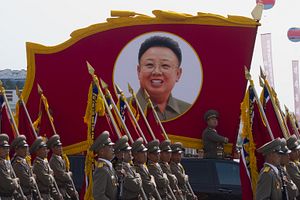While there is a lot of commentary on the territorial disputes in the South China Sea, there are other storms brewing in East Asia, posing a fresh threat to the security of the United States and its allies. North Korea, the Hermit Kingdom, has been boasting about its nuclear breakout in recent weeks.
Last week, the Democratic People’s Republic of Korea (DPRK) claimed that it had successfully miniaturized nuclear warheads to fit on the head of a missile, meaning that it can produce smaller and more diversified nukes. The statement comes days after North Korea reported that it had successfully carried out an ejection test of its KN-11 ‘Polaris-1’ submarine-launched ballistic missile (SLBM) earlier this month.
Although both U.S. and South Korean officials appear to downplay the announcement and raise questions about the reliability of the Kim Jong-un regime, they acknowledge that North Korea is working on nuclear weapons and a ballistic missile development program, which could eventually threaten the United States and its partners in East Asia.
Additionally, Pyongyang has increased tensions with new demonstrations of brutality, as Kim Jong-un is believed to have executed his defense minister, Hyon Yong-chol, with the use of an anti-aircraft gun.
In response to the ongoing crisis from North Korea, an unpredictable actor in the international arena, the calls for Washington to exert stronger pressure upon North Korea are rising. Some urge the current Administration to harden its policy towards the DPRK, which recklessly violates international law.
Senator Cory Gardner (R-CO), chairman of the Subcommittee on East Asia, the Pacific, and International Cybersecurity Policy, said “it is clear that the Administration’s current policy of so-called ‘strategic patience’ with regard to North Korea has been a failure, and it’s time to change course.” He made the comment to introduce a resolution in the U.S. Senate advocating for additional targeted sanctions against the North.
The resolution called on the Obama administration to immediately reverse its current policy and never resume any negotiations unless Pyongyang ceases its nuclear program and improves its atrocious human rights record significantly. It also urged the United States to re-designate the DPRK as a state sponsor of terror. (North Korea was removed from the list in 2008.)
Currently, three U.S. government agencies have sanctions in place against the DPRK. All imports originating from the North are prohibited by the Office of Foreign Assets Control (OFAC) of the Department of Treasury. With respect to exports, all exports to North Korea require licenses from the Bureau of Industry and Security (BIS), Department of Commerce. The Directorate of Defense Trade Controls (DDTC) of the Department of State denies authorizing the export of U.S. Munitions List (USML) items to North Korea. Reacting in part to the North Korean cyber-attack on Sony in late 2014, the president additionally issued Executive Order 13687, imposing additional sanctions on targeted entities.
Regardless of all these measures, however, the Administration faces criticism for its reluctance and lack of political will to impose more punitive measures. Bruce Klingner, a senior research fellow at the Heritage Foundation, stated that “the U.S. and the United Nations have imposed far less restrictive sanctions against Pyongyang than against Tehran.”
Yet there are signs that the U.S. may soon tighten its sanctions to close loopholes used by the regime. In February, Rep. Ed Royce (R-CA), Chairman of the House Foreign Affairs Committee, and Rep. Eliot Engel (D-NY), the Committee’s Ranking Member, introduced the North Korea Sanctions Enforcement Act of 2015 (H.R. 757), targeting North Korea as well as foreign entities that assist its nuclear and missile programs. This bipartisan legislation would impose harsher measures against the DPRK, focusing not only on the issue of nuclear proliferation and illicit financial activities, but also on the brutal human rights violations in the country.
While a firmer stance could galvanize momentum to press North Korea, any sanctions regime must have international support to be effective. As far as current efforts are concerned, the UN has also implemented sanctions, which have a broader reach than those of the U.S., as all UN member states are obligated to enforce such measures.
However, according to a recent report by the U.S. Government Accountability Office (GAO), the UN did not receive reports from more than half of member states and cannot know the extent to which members are actually implementing the sanctions. Lack of support from the international community impedes the sanctions effort altogether.
Engel stated that “effectively enforcing sanctions is not something that the U.S. can do alone.” Indeed, it requires international support in order to constrain North Korea’s behavior through such measures. For building a strong capacity, the burden may largely rest on the United States to rally other states to its cause of effectively sanctioning North Korea.
Needless to say, the security situation on the Korean peninsula has only deteriorated despite international efforts. Justice Michael Kirby, chairman of the UN Commission of Inquiry (COI), has referred to the Kim regime as “a totalitarian State that does not have any parallel in the contemporary world.” In this regard, imposing tougher sanctions can be more promising than ignoring its escalating threats at the expense of international peace and human rights.
So Yeon Kim is an Asan Young Fellow at the Asan Institute for Policy Studies of Korea.
































